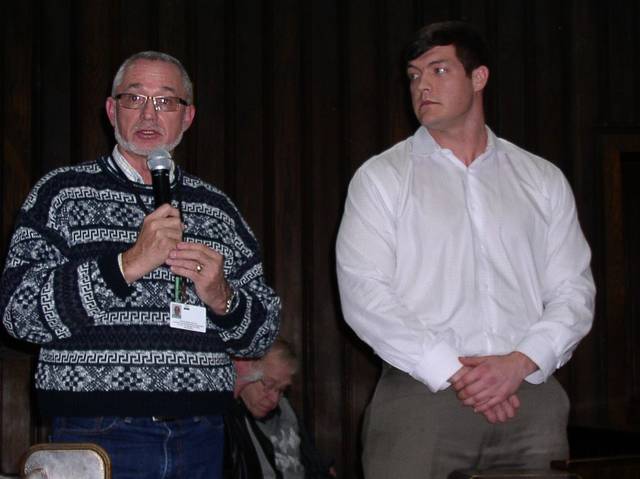Commission tables energy savings program
Published 10:08 am Tuesday, December 5, 2017

Jan Runions | Claiborne Progress
Energy Systems Group (ESG) account executive Josh McNeil, right, and Dr. Joseph Miller, director of schools, answers questions put to them by the Claiborne Commission during its November meeting.
The county school system was charged by the Claiborne Commission with the task of seeking alternative energy saving programs before committing to a contract with Energy Systems Group (ESG). A motion by commissioner Danny Longworth to table the matter effectively halted the vote, during the November meeting.
The Claiborne school board had voted to move forward earlier this month with the ESG contract after discussing the proposal at length. The final step to sealing the agreement would have been approval by the county commission.
Dr. Joseph Miller, director of schools, and ESG account executive Josh McNeil touched on the fine points of the proposal during a somewhat lengthy discussion.
Miller said he and others had traveled to nearby Anderson County to explore the strides made in energy savings via its ESG contract undertaken some four years ago.
Anderson County schools are about one-third larger than Claiborne and includes 17 campuses, 12 of which underwent upgrades through the program, he said.
According to Miller, Anderson County is saving about $200,000 per year in energy costs.
“They’re taking some of that money that they’re saving and recycling it back into other component areas of their budget. For example, upgrades for maintenance facilities. So, they are running about ($200,000) ahead of schedule on cost savings with these upgrades done through ESG,” said Miller, adding the director of schools and maintenance supervisor he spoke with recommended the program.
He said going with the ESG contract would be “budget neutral,” meaning no new tax dollars. The 1 percent loan needed for the initial energy upgrades would be paid back with the realized savings.
Commissioner James Hatmaker asked if there would be a conflict of interest between the current Trane contract and ESG.
“I would like to think that wouldn’t be the case. I think there’re some similarities, but yet, perhaps, there’d be some differences between the two vendors,” said Miller.
He said the only agreement now existing between Trane and the county is one for maintenance.
Commissioner Longworth said the county had received an email from Trane, apparently requesting to be included in any energy savings bidding process. Apparently, Trane had offered a ‘free’ assessment.
“When Trane originally bid their analysis, the cost on the LED lights were so expensive, it wasn’t economically feasible to do that. It is, now,” said Longworth.
He made a motion to table the matter to allow the school board to look for possible alternatives.
“That $39,000 audit — it’s going to be budget neutral but, if we don’t have to have it, why pay it,” said Longworth, referring to the cost of an energy assessment that the county would be liable for if it decides not to move forward with ESG.
Miller said he had questions.
“What does Trane define as ‘free.’ At what point is there some sort of tradeoff, here. ESG came through (and) did a preliminary look, much like Trane did.
“So, the question I would have for Trane is: on a comprehensive needs assessment, would there be any type of charge, or would it be free, as well,” said Miller.
McNeil said he would like to clarify some points brought out by the email, which was discussed earlier.
“In terms of free — we’ve been working with Claiborne since March. And, we did a free assessment that included looking at all the utility bills, walking through all the schools and coming back to present the analysis, which we presented over the past couple of months. We’ve been at this, for quite some time.
“The $39,000 is for a detailed engineering, moving forward — any type of work associated with getting this project ‘shovel ready,’” said McNeil.
The previous project development agreement with Trane, he said, cost “many times more than what we’re talking about.”
He reminded the commission that the $39,000 would not be due ‘upfront.’ He said it would be ‘rolled into’ the overall cost of the project, if the county decides to move forward with ESG.
“If the project doesn’t pay for itself … then, the county doesn’t owe us anything. And, that’s the way it’s contractually written,” said McNeil, adding that it is common with other companies across the state to rack up detailed engineering costs in the “several hundreds of thousands.”
Miller said his figures show a three year energy savings of $268,000.
It would take about 12 years to pay back the low-interest loan taken out ‘on the front end’ of the contract to initially pay for the upgrades.
Miller estimated the project would cost from $2 million to $3 million to complete.
The initial 15-year Trane agreement loan will be paid off within five to six years, according to Claiborne finance officer Sam Owens.
The matter is expected to be brought back during the December meeting.



